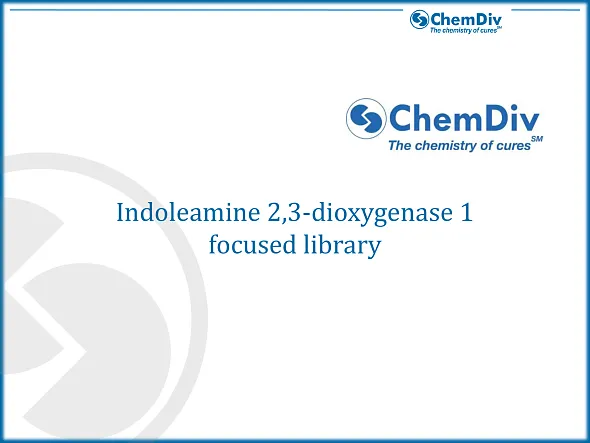Indoleamine 2,3-dioxygenase 1 Focused Library
ChemDiv’s small molecule library focused on indoleamine 2,3-dioxygenase enzyme contains 6,000 compounds.
Indoleamine 2,3-dioxygenase (IDO) plays a critical role in the tryptophan metabolism through the kynurenine pathway. As a heme-containing enzyme, IDO catalyzes the first step in the degradation process of tryptophan, leading to its local depletion. This mechanism serves as a natural defense strategy, exploiting the sensitivity of many infectious agents to tryptophan availability. By reducing local tryptophan levels, IDO activity can inhibit the proliferation of various pathogens, supporting the immune system's efforts to counteract infectious pathogens. Beyond its antimicrobial role, the activity of IDO influences the immune environment by contributing to the maintenance of homeostasis, demonstrating the enzyme's versatility in physiological regulation.
IDO functions are far beyond its metabolic function, as it has emerged as a significant regulator of immune responses, with implications for a wide range of diseases. The enzyme's ability to suppress local T cell activity and promote immune tolerance is particularly relevant in contexts such as pregnancy, where it helps prevent fetal rejection, and in organ transplantation, where it contributes to the acceptance of transplanted tissues. In cancer, IDO expression by tumor cells can enable them to evade immune surveillance by creating an immunosuppressive microenvironment. This immune modulation capability of IDO also plays a role in the pathogenesis of various inflammatory and autoimmune disorders, where its dysregulation can exacerbate disease conditions. Therefore, IDO represents a promising therapeutic target, with inhibitors being explored to enhance immune responses against tumors or to modulate immune tolerance in autoimmune diseases, highlighting its dual role in both supporting physiological functions and contributing to disease development.
IDO serves as a promising target for multifaceted therapeutic interventions. Inhibiting inappropriate IDO activity in tumors in vivo may reduce the tumors' ability to evade immune surveillance, thereby promoting their clearance. Furthermore, in neurological disorders characterized by elevated levels of the excitatory neurotoxin quinolinic acid, there is considerable interest in the potential utility of kynurenine 3-monooxygenase inhibitors. These inhibitors aim to block the production of quinolinic acid while simultaneously increasing levels of kynurenic acid, an antagonist to quinolinic acid toxicity. This dual action not only mitigates the harmful effects of quinolinic acid but also leverages the protective properties of kynurenic acid, offering a promising approach to treating neurodegenerative diseases.
A library of small molecule inhibitors targeting IDO presents a valuable resource for drug discovery and therapeutic development, particularly in the context of cancer and neurological disorders. These inhibitors hold the potential to modulate the immune system by preventing tumor cells from using IDO-mediated mechanisms to evade immune detection, thereby enhancing the efficacy of cancer immunotherapy. Selective blocking of the IDO pathway by inhibiting agents reduces the production of neurotoxic metabolites such as quinolinic acid, which is implicated in the pathogenesis of several neurological disorders. This targeted approach could lead to the development of novel treatments that offer improved specificity and fewer side effects compared to broader immunosuppressive or neuroprotective strategies. Additionally, the diversity within such a library allows for the identification of compounds with optimal pharmacokinetic and pharmacodynamic properties, paving the way for personalized medicine approaches in treating complex diseases where IDO plays a crucial role.
